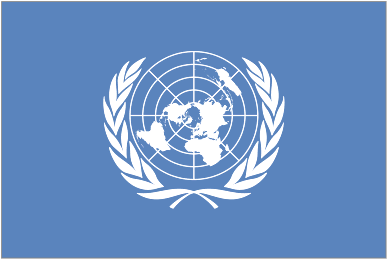October 24
“Millions of tongues record thee, and anew
Their children’s lips shall echo them, and say—
‘Here where the sword united nations drew,
Our countrymen were warring on that day!”–Lord George Gordon Byron, Childe Harold’s Pilgrimage

In 2009 the UN turned 63, the same age its leading proponent was when he died in April 1945, a month shy of Germany’s surrender.
Franklin Delano Roosevelt had spent his 63rd birthday (January 30, 1945) aboard the USS Quincy on route to meet Churchill and Stalin in the Crimea. Stalin had refused to travel far “on doctor’s orders”, so FDR, stricken with polio and two months from death, trekked halfway across the world. Churchill once said of Yalta, “We could not have found a worse place if we had spent ten years on research.”
At Yalta, Churchill and Roosevelt lost on the issue of future democratic elections in Soviet-controlled Poland. But they got one thing from Stalin. They settled the “veto issue” that had halted the negotiations of the formation of the “United Nations”, an international organization that would curb future territorial aggression.
[Previous to this, the term “United Nations” referred to an alliance of countries fighting against the Axis Powers in World War II. The January 1, 1942 Declaration by United Nations had stated that “Each Government pledges itself to employ its full resources, military or economic, against those members of the Tripartite Pact and its adherents with which such government is at war.“]
On April 12, 1945, hours after FDR’s death, the new VP Harry Truman was sworn in as President of the United States, inheriting a World War and an atomic bomb project so secret that the Soviets had known of its existence before he did. Truman’s first decision as President, immediately after taking the oath, was to carry on with the scheduled UN conference in San Francisco. “It was what Roosevelt wanted,” he said.
Two weeks later, representatives of 50 countries met in San Francisco to forge the Charter of the United Nations, based on negotiations between the US, UK, USSR and China.
Twenty five years earlier a similar organization, the League of Nations, had stumbled in its infancy when Woodrow Wilson, who had pushed the idea of the League of Nations to the rest of the world, failed to gain enough support from his own Congress to join it.
This time, with the hindsight of WWII, the U.S. Senate approved the charter, 89 to 2. On August 8, two days after Truman dropped an atomic bomb on Hiroshima and one day before Nagasaki, the U.S. became the first country to submit its formal documents to the United Nations.
It was an ominous moment of gestation for a world peace organization, and a foretelling one. The power of all the countries of the world would be eclipsed by the atomic weapons of the two most powerful. And thus for most of its life, the UN’s influence was secondary to the Cold War tug-of-war between the U.S.-led NATO and the Soviet Union’s Warsaw Pact.

The UN first convened on October 24, now observed as United Nations Day.
Today, if there is one thing that unites all the contradictory and warring countries of the earth, it may be universal disappointment at the United Nations, seen as a tool of the U.S. by much of the West, and as a tool of the West by the rest of the world. While in the U.S., as conservative commentator Bill O’Reilly once told War Crimes Ambassador David Scheffer, “I’m not going to make an excuse for the U.S. government. Our intelligence agencies obviously have been troubled. But you are making an excuse for the United Nations, which I think is so impotent there isn’t enough Viagra in the world.”
Still, for all its faults, this year the United Nations is technically older than most governments on earth. That means over 100 nations have gained their independence since its formation, and most of these were subjugated colonies and satellites of the Big Five in charge. Even if the UN isn’t directly responsible for all these births, it has created a forum in which the countries of the earth are forced, for a brief moment, to see themselves through their neighbors’ eyes. And in a world this small, that may prove to be the most powerful negotiation tool of all.
